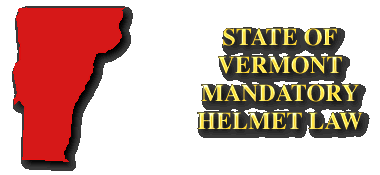

STATUTE:
Title 23. Motor Vehicles. Chapter 13. Operation of Vehicles. Subchapter 14. Equipment. Article 2. Motor Vehicles Generally. Section 1256. Motorcycles--Headgear. :"No person may operate or ride upon a motorcycle upon a highway unless he wears upon his head protective headgear reflectorized in part and of a type approved by the commissioner. The headgear shall be equipped with either a neck or chin strap."
FINE:
If you have information about the amount of the fine for violating Vermont's helmet law, please e-mail it to us. Thanks.
STANDARDS:
I need the Vermont regulations to determine exactly what standard they have adopted to define "protective headgear". Apparently the "commissioner" (of what?) approves Vermont's so-called safety equipment. When we get an answer, you will find it here.
COURT DECISIONS:
"Motorcycle helmet law is entitled to presumption of constitutionality." Benning v. State (1994) 161 Vt. 472, 641 A.2d 757."There is no heightened concern for personal liberty embedded in the Vermont Constitution that would render motorcycle helmet law unconstitutional." Benning v. State (1994) 161 Vt. 472, 641 A.2d 757.
"Link between safety for highway users and motorcycle helmet law is rational, since it minimizes the extent of injuries for which government or individuals are financially responsible." Benning v. State (1994) 161 Vt. 472, 641 A.2d 757.
"Motorcycle helmet law is not void for vagueness, since statute clearly proscribes failure to wear a helmet and "approved helmet" standards were sufficiently defined or ascertainable." Benning v. State (1994) 161 Vt. 472, 641 A.2d 757.
We won't say why, but we have a feeling that this particular portion of this decision is going to be revisited, soon.
"In equal protection challenge to motorcycle helmet law, there is rational basis between motorcyclists and automobile drivers, whose vehicles afford them substantially more protection than does a motorcycle; there is also rational basis for distinction between motorcyclists and moped riders, since the latter travel at a lower rate of speed and are forbidden from riding on state highways." Benning v. State (1994) 161 Vt. 472, 641 A.2d 757.
"It lies within power of the legislature to adopt reasonable measures for the promotion of safety upon the public highways in the interests of motorists and motorcyclists and others who may use them." State v. Solomon (1969) 128 Vt. 197, 260 A.2d 377.
"This section, applies to all motorcyclists equally, is directly related to highway safety, bears a real and substantial relation to the promotion of the welfare and safety of the general public as distinguished from the welfare solely of the individual motorcycle riders, did not deprive operator convicted of failure to wear protective headgear of his liberty, or restrain his person or actions, is a reasonable requirement, to be observed so that the public safety will not be jeopardized, and as legislation intended to protect persons in other vehicles from exposure to danger created by a motorcycle out of control, is clearly within the state's police power and in no way violates the state or federal constitution." State v. Solomon (1969) 128 Vt. 197, 260 A.2d 377.
COMMENTARY:
From our beginning in 1993, it has been the position of the Helmet Law Defense League that all helmet laws are unconstitutional , in the absence of clear guidelines on how to comply with the statute -- like with a list of "approved helmets."
NO LIST? NO LAW! If a state, any state, cannot answer the question:
"How can a motorcyclist comply,
with certainty ,
with the provisions of the helmet law?"that state's statute(s) requiring the wearing of
a "helmet," "safety helmet," or "protective headgear"
is unconstitutionally vague.Although the Vermont Legislature may believe that they can authorize the "commissioner" to adopt standards which define "protective headgear," the commissioner is confined, by law, to adopting only those standards established by the National Highway Traffic Safety Administration. If the commissioner has exceeded his authority and adopted anything other than Federal Motor Vehicle Standard (FMVSS) 218, the Vermont helmet law can be successfully challenged on that basis alone, and removed. (see Juvenile Products v. Edmisten, 568 F.Supp. 714 (1983))
If the commissioner has adopted FMVSS 218, which the law insists that he ultimately must, the Vermont helmet law is thereby rendered unconstitutionally vague and can be challenged on that basis, and removed. (see Washington v. Maxwell , 74 WASH.APP. 688, 878 P.2D 1220 (1994))
We believe that if someone will write to the commissioner and ask how to comply with the helmet law, "with certainty," someone can take whatever answer (or, more likely, a refusal to answer) to the courts, and Vermont bikers will be 100% FREE of the helmet law!

Last updated: April, 1997
© Copyright 1996 HLDL. All Rights Reserved.
Webmaster: quig